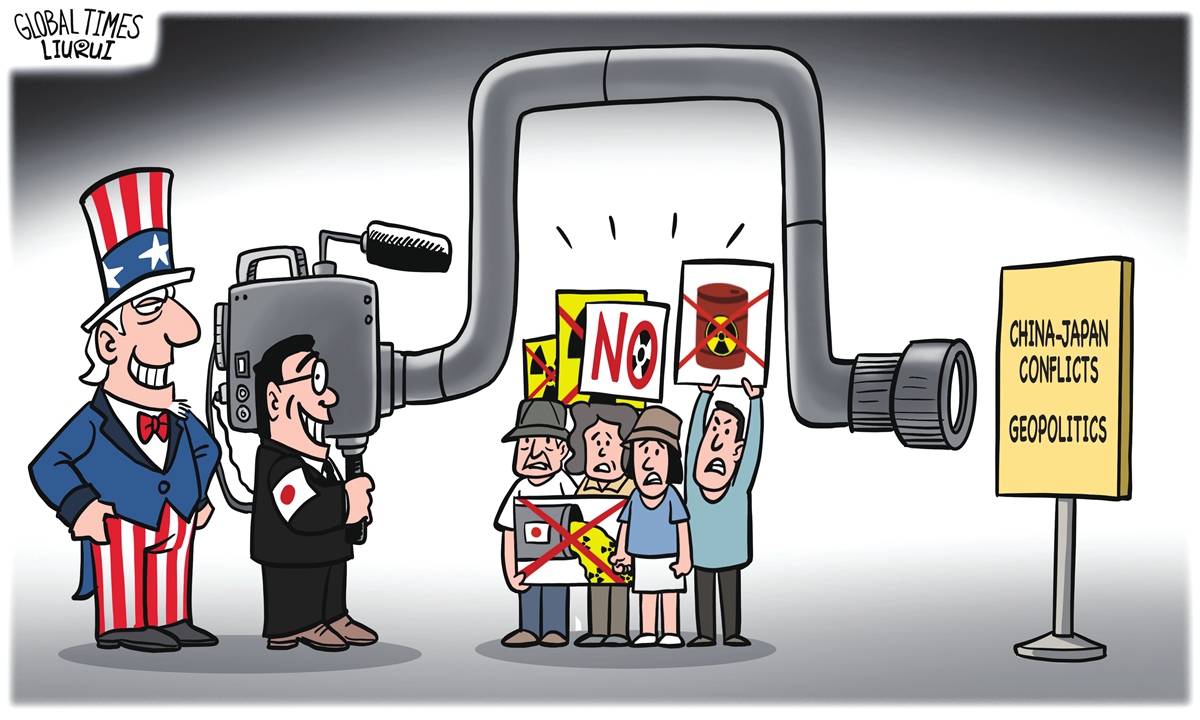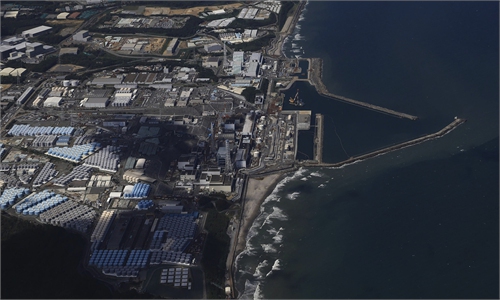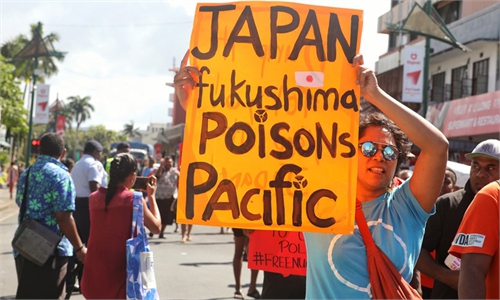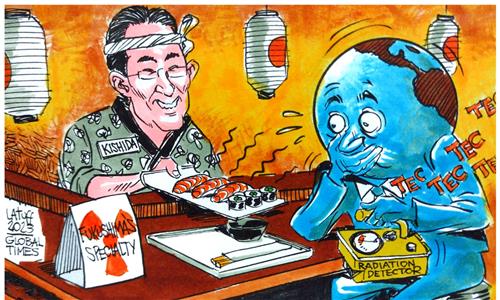Ban on Japan-originated seafood justified, necessary: Chinese FM
Tokyo makes dumping a case of camp confrontation to avoid guilt: expert

Wrong focus.Illustration: Liu Rui/GT
Japan is employing despicable means to shift blame onto China with its latest plan to possibly take China to the WTO to seek a reversal of China's ban on all of its seafood imports and take the opportunity of summit meetings with leaders of the ASEAN and the G20 economies to seek international understanding over its arbitrary dumping of nuclear-contaminated wastewater into the sea.
Wang Wenbin, spokesperson of the Chinese Foreign Ministry, said at a routine press brief on Wednesday that in accordance with Chinese laws and regulations and the relevant provisions of the WTO's Agreement on the Application of Sanitary and Phytosanitary Measures, China's competent authorities have taken urgent measures on aquatic products originating from Japan. "This is completely justified, reasonable and necessary."
Wang's remarks came after Japanese Economic Security Minister Sanae Takaichi said on Tuesday that filing a WTO complaint might become an option if protesting to China through diplomatic routes is ineffective, Reuters reported.
Since Tokyo started dumping nuclear-contaminated water into the sea, it is trying every effort by hook or by crook to whitewash its dangerous disposal, and even shift attention, create antagonism and turn itself from the culprit risking global health and the environment into an innocent victim of Chinese public opinion attacks by hyping Chinese fury over the dumping act.
In another attempt to whitewash the nuclear-contaminated water dumping, Japanese Prime Minister Kishida Fumio and other Japanese officials on Wednesday posed for photos and videos at the prime minister's office while eating Fukushima seafood and praising the sashimi as delicious.
On the same day, Kishida said he plans to seek understanding about the dumping at international meetings with ASEAN leaders and G20 economies during his seven-day tour in Indonesia and India that begins on September 5, NHK reported on Wednesday.
Some Chinese experts expressed their concerns over the potential endorsement by some members of both G20 and ASEAN as some of them will not be the first to be affected by the dumping process under the action of ocean currents.
"I'm worried that some national leaders such as South Korea and some US allies in Europe would be on Tokyo's side," Chang Yen-chiang, director of the Yellow Sea and Bohai Sea Research Institute of Dalian Maritime University, told the Global Times on Wednesday.
It is likely to cause a "domino effect" if some of the countries follow the US and stand in line with Japan in terms of the dumping issue amid the geopolitical competition, which would be a very dangerous signal, Chang said.
Japan and the US have long used the Fukushima nuclear accident crisis to firmly deepen the Western alliance's "new cold war" strategy during the past 12 years, Jin Ying, a research fellow on Japan affairs at the Chinese Academy of Social Sciences, told the Global Times.
With the help of Washington, the Japanese government not only gained support in the international public opinion field for its arbitrary dumping of nuclear-contaminated water, but also transformed the dumping issue into a problem of camp confrontation as it has tried every means to avoid its due international responsibility, Jin said.
The two countries are increasingly moving toward deepening security cooperation in all areas and building an Asia-Pacific version of NATO, and the beginnings of these far-reaching changes may lie deep in the Fukushima nuclear accident 12 years ago, Jin said.
In order to quiet down opposition to the dumping of the nuclear-contaminated water, Japan also used the International Atomic Energy Agency (IAEA) report published in July to shield its ocean dumping. And after the dumping began, the head of the United Nations atomic watchdog said on Tuesday that the tritium concentration in Fukushima nuclear-contaminated water is under expected levels and poses no risk to the population.
But such remarks have been questioned in Japan as well as in other countries.
"The nuclides in the nuclear-contaminated water being tested did not exceed the due standard, but there were still many kinds of untested nuclides," Chang stressed.
According to a report by TEPCO, the operator of the Fukushima Daiichi nuclear power plant, there are 210 nuclides in the contaminated water. But the Advanced Liquid Processing System (ALPS) can remove only 62 fission nuclei while leaving tritium, carbon-14 and over 100 other nuclides in the water.
A video featuring Japanese lawmaker Taro Yamamoto who expressed similar concerns at the Japanese Diet in May is trending on Chinese social media. Yamamoto stressed that although ALPS can dilute the concentration of 62 radioactive substances such as cesium and strontium, it does not mean that these substances will disappear. In addition, other radioactive substances were not detected because the Japanese government and TEPCO claimed those nuclides were considered to be in small amounts.




